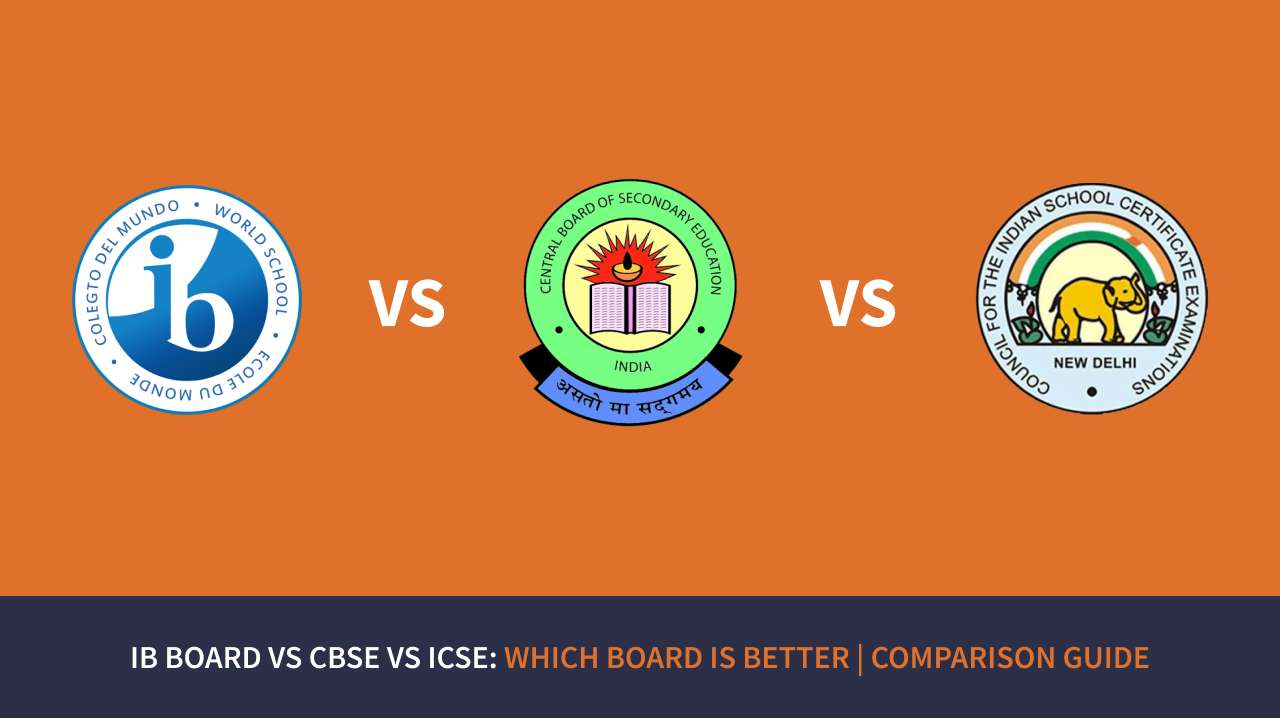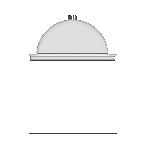IB Board vs CBSE vs ICSE: Which Board Is Better | Comparison Guide

The early stage of education is a vital element in developing the right personality for any child. So, parents have to look for an institution that offers the right education, extracurricular activities, teachers, and more. It ensures their child learns in and from the best environment to build their life. However, when looking for the right institute for your child’s education, there are a few things to consider. One of them is which board of education is the right choice for the child. There are three significant education boards- IB(International Baccalaureate), CBSE( Central Board of Secondary Education), and ICSE(Indian Certificate of Secondary Education). This guide will help parents find the best among these for their children.
Overview of IB (International Baccalaureate)
International Baccalaureate started in 1968 with headquarters in Switzerland and is an international education board. The board provides 4500+ school affiliations globally. It governs standard education worldwide in different schools offering education to children from 3 to 19 years old.
Overview of CBSE (Central Board of Secondary Education)
CBSE is one of the most popular and prestigious education systems in India founded in 1962. The board has Hindi and English as their official language and headquarters in Delhi. The majority of schools in India have CBSE as their main board handled by the Government. CBSE board offers education from nursery to senior secondary school i.e. 12th standard.
Overview of ICSE( Indian Certificate of Secondary Education)
Indian Certificate of Secondary Education started in 1958 has English as their core and medium of Instruction. The board conducted by Council for the Indian School Certificate Examination(CISCE) offers 10th and 12 standard education. It offers a practical and analytical approach to its curriculum. ICSE boards can be found in many schools in India. The board or council handling ICSE is a private board and institution.
What is the difference between IB Board, CBSE Board, and ICSE Board?
All three major boards operating in India have different sets of distinctive points. They have their own set of rules, regulations, pros, and cons. One of the key differences is their conducting bodies, CBSE is under the control of the government of India, ICSE is under the control of a private entity in India while IB is under the control of an international private entity in Singapore. These boards can be distinguished over different factors that will help parents to find the best school for their children. Therefore, here are a few factors on how you can distinguish between boards:
- Subjects offered
- Curriculum
- Conducting Body
- Key features
- Assessment and evaluation
- Fee
- Schools, and more.
Major differences between IB, CBSE, and ICSE boards
To help you differentiate between different boards, we are comparing different factors of the boards. Here is the difference between Ib and CBSE and ICSE as per vital factors:
Curriculum
The curriculum is vital to understand what they offer and what your child will be exposed to. CBSE, ICSE, and IB schools have their own standard and approach for developing curriculum. While both ICSE and CBSE have an indo-specific approach as they are Indian boards. Ib on the other hand follows a more global approach in their curriculum. To help you understand better, here is the difference between the curriculum of all boards:
| Aspect | IB Board | ICSE | CBSE |
| Syllabus | International Curriculum | India-Specific Curriculum | India-specific curriculum |
| Structure | PYP, MYP, DP | Primary, Secondary, and Senior Secondary | Primary, Secondary, Senior Secondary |
| Focus | Holistic education, global perspectives | Balanced approach on languages, science, humanities, and activities | Academic-oriented, national-level focus |
| Flexibility | Encourages interdisciplinary learning | Strict adherence to Prescribed Syllabus | Prescribed syllabus |
Assessment and Evaluation
The IB, CBSE, and ICSE boards have different assessments and evaluation is important to consider when selecting. All three boards have different evaluation and assessment systems as follows:
CBSE
- The classes are evaluated and assessed in two terms Term 1 and Term 2, both terms hold equal importance and marks are calculated with equal weightage in the end.
- For students in X, XI, and XII, internal assessment and practical exams are also considered.
ICSE
- ICSE uses grades to assess students up to 10th standards. 1 grade is lowest and 9th is highest. Along with studies, social and community work, and extracurricular activities are also focused on mark sheets.
- For X, XI, and XII standard assessment similar to CBSE is followed.
IB
- IB uses external and internal assessments. The external assessment includes essays, data-response questions, text-response questions, structured problems, multiple-choice questions, short-response questions, and case-study questions.
- Internal assessments include oral work in languages, laboratory work in the sciences, fieldwork in geography, investigations in mathematics, and artistic performances.
- IB offers the same scores for higher-level (HL) and standard-level (SL) courses.
- Students gaining more than 3 or 3 grades in language and literature and subjects completed in different languages are granted a bilingual diploma.
Syllabus
All three boards have different syllabus but ICSE and CBSE are somewhat similar. CBSE and ICSE boards provide Indo-specific syllabus while IB focuses on globally standardized syllabus.
Recognition and Acceptance
All the boards vary in their recognition and acceptance across the globe. ICSE schools in Pune offering ICSE board certification are recognized in India and have validation across the globe. The board is recognized in India and abroad for higher education and other purposes. CBSE being India’s largest board and government operated is recognized worldwide by universities and more. IB is the global education board itself, so universities worldwide including India accept IB.
Fee Structure
Fee Structure is one of the important factors that parents consider when selecting a school. Ib board vs CBSE vs ICSE, all have significant differences in their fee structure. The fee structure can be further categorized and distinguished as follows:
| Category | ICSE | IB | CBSE |
| Books Cost | Higher | Expensive | Moderate |
| School Admission Fee | Higher | Expensive | Moderate |
| Tuition Fee | Higher | Expensive | Moderate |
IB Board Key Features
Is Ib harder than CBSE? This is a common question among parents. If you compare the Indian structure of other boards with the international exposure of IB, it might be complex but has a highly diversified approach. To help you understand more, here are the features of IB:
- It follows standardized global education to students that focus on a more hands-on approach to learning.
- It covers a more research-oriented, communication, social interaction, self-management, and thinking approach in the program.
- Ib covers a more diverse, globally standardized approach to curriculum, syllabus, and extracurricular activities.
CBSE Board Key Features
CBSE board offers its key features that allow students to learn and find their direction in India and later abroad if required. CBSE schools in Pune and across India offer various features to students. Here are some of the CBSE features that you can check:
- CBSE has a more comprehensive syllabus with a balance of other activities to provide overall development.
- CBSE curriculum is followed by competitive exams in India such as JEE, NEET, and more. So, students studying on the CBSE board have more understanding.
- The cost of CBSE schools overall is lower compared to other boards.
ICSE Board Key Features
Similar to IB and CBSE, the ICSE board has its own features. ICSE board is somewhat medium between IB and CBSE. It has a few features of both. ICSE boards can offer your child the following features:
- ICSE board provides a holistic approach with a global perspective on Indio-Specific curriculum.
- Being an India-specific board, it helps with entrance exams as the syllabus followed by entrance exams is similar to CBSE and ICSE.
- Many schools in India offer ICSE boards which are conducted by a private body. It has English as its focus and is recognized globally.
- The cost of ICSE is lower compared to IB and higher compared to CBSE.
Subjects Offered
Each board has its own specific subject matter and syllabus. While IB focuses on English and Global standards, CBSE and ICSE focus on English and Indian standards. So, CBSE and ICSE somewhat offer similar subjects. Here is the list of subjects offered by all three boards of India:
| Category( Classes or levels) | ICSE | CBSE | IB |
| 1-5 | English,Hindi, Environmental Sciences,Maths, Languages | English,Hindi, Maths, Languages, Environmental Sciences | |
| 5-10 | English, second language and History, economics, mathematics, Civics and Geography. Science, environmental science, arts, computer applications, and physical education | English, Science, Social Science, Hindi, Maths, and other subjects | |
| 11-12 | science, arts and commerce streams | English, Physics, Chemistry, Maths/Biology, Humanities stream subjects, Commerce stream subjects, Optional subjects | |
| PYP | – | – | Language, Social studies, Maths, Science, Arts, Personal and physical education |
| MYP | – | – | 1st language, 2nd language, Humanities, Maths, Science, Arts, Physical education, Computers |
| DP |
Studies in language and literature, Individuals and societies, Language acquisition, Sciences, The arts Mathematics, |
Conclusion & Call to Action
All three boards have their own pros and cons, features, and facilities. Depending on your requirement and criteria for selecting school for your child, you can choose from these boards. However, if you are considering international exposure and approach throughout schooling, IB is your final choice. CBSE and ICSE boards are somewhat similar in terms of Indian curriculum and competitive exams. However, IB gives your child a global perspective. So, if you are looking for global exposure for your child, MIT gurukul is the best option.

